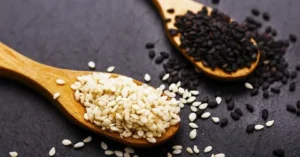The Top 9 Health Benefits of Flaxseed
Flaxseed, often referred to as a superfood, is packed with essential nutrients like protein, fiber, and omega-3 fatty acids. These tiny seeds offer many health benefits, making them a valuable addition to any diet. Below are the top 9 health benefits of flaxseed.
1. Rich Source of Plant-Based Protein
Flaxseed is an excellent plant-based protein source, essential for muscle repair, growth, and overall health. A single serving of flaxseed provides a significant amount of protein, making it a great option for vegetarians, vegans, and anyone looking to increase their protein intake naturally.
2. High in Dietary Fiber
Flaxseed is incredibly rich in dietary fiber, which plays a crucial role in maintaining digestive health. The soluble fiber in flaxseed helps regulate blood sugar levels and supports a healthy gut by promoting regular bowel movements and preventing constipation.
- Improves Digestive Health: The fiber content in flaxseed aids in digestion and helps to prevent digestive issues such as constipation and irritable bowel syndrome (IBS).
- Regulates Blood Sugar Levels: The soluble fiber in flaxseed slows down the absorption of sugar, helping to maintain stable blood sugar levels.
3. Loaded with Omega-3 Fatty Acids
Flaxseed is one of the best plant-based sources of omega-3 fatty acids, particularly alpha-linolenic acid (ALA). Omega-3s are known for their anti-inflammatory properties and play a key role in heart health, brain function, and overall well-being.
- Supports Heart Health: Omega-3 fatty acids help reduce the risk of heart disease by lowering blood pressure, reducing cholesterol levels, and preventing the formation of clots.
- Enhances Brain Function: Regular consumption of omega-3 fatty acids can improve cognitive function and reduce the risk of neurodegenerative diseases.
4. Promotes Weight Management
Flaxseed can be an effective addition to a weight management plan. The combination of protein, fiber, and healthy fats helps to promote a feeling of fullness, reducing overall calorie intake and preventing overeating.
- Suppresses Appetite: The high fiber content in flaxseed helps you feel fuller for longer, which can reduce the urge to snack between meals.
- Supports Fat Loss: The omega-3 fatty acids in flaxseed may also help reduce body fat and promote lean muscle mass.
5. Reduces Cholesterol Levels
Regular consumption of flaxseed has been shown to lower total cholesterol and low-density lipoprotein (LDL) cholesterol levels, commonly referred to as “bad” cholesterol. The fiber in flaxseed binds with cholesterol in the intestine, preventing its absorption into the bloodstream.
- Lowers LDL Cholesterol: By binding with cholesterol, flaxseed helps to lower LDL levels, reducing the risk of heart disease.
- Promotes Heart Health: Lower cholesterol levels contribute to better overall cardiovascular health.
6. Lowers Blood Pressure
Flaxseed has been found to have a significant impact on reducing blood pressure, which is a major risk factor for heart disease. The omega-3 fatty acids and lignans in flaxseed help to relax blood vessels, improving blood flow and reducing hypertension.
- Reduces Hypertension: The nutrients in flaxseed help relax and dilate blood vessels, lowering blood pressure.
- Supports Cardiovascular Health: By lowering blood pressure, flaxseed reduces the strain on the heart and decreases the risk of stroke and heart attack.
7. Supports Healthy Skin
The omega-3 fatty acids and antioxidants in flaxseed contribute to healthy, glowing skin. These nutrients help reduce inflammation, prevent skin dryness, and promote a youthful complexion.
- Moisturizes Skin: Omega-3 fatty acids help maintain skin moisture, preventing dryness and irritation.
- Reduces Skin Inflammation: The anti-inflammatory properties of flaxseed help reduce skin conditions like acne, eczema, and psoriasis.
8. Boosts Digestive Health
Flaxseed supports overall digestive health through its high fiber content and anti-inflammatory properties. It can help prevent and manage various digestive disorders, including diverticulitis, IBS, and inflammation of the gastrointestinal tract.
- Prevents Constipation: The soluble fiber in flaxseed helps soften stool, making it easier to pass.
- Reduces Inflammation: Flaxseed’s anti-inflammatory properties help soothe the digestive tract, reducing the symptoms of IBS and other inflammatory conditions.
9. Rich in Antioxidants
Flaxseed is loaded with lignans, powerful antioxidants that help protect cells from oxidative stress and reduce the risk of chronic diseases. These antioxidants also play a role in supporting hormone balance and overall health.
- Protects Against Oxidative Stress: Lignans in flaxseed help neutralize free radicals, reducing the risk of chronic diseases such as cancer.
- Supports Hormone Balance: The antioxidants in flaxseed help balance hormone levels, particularly in women, reducing the risk of hormone-related cancers.
How do you add flaxseed oil to your diet?
Adding flaxseed oil to your diet is simple and can be done in a variety of ways. Here are some easy and effective methods:
1. Drizzle Over Salads
- Use flaxseed oil as a dressing for your salads. Its nutty flavor pairs well with leafy greens, vegetables, and even fruits. Simply drizzle it over your salad or mix it into a vinaigrette.
2. Add to Smoothies
- Blend flaxseed oil into your morning smoothie for an extra boost of omega-3 fatty acids. It blends well with fruits, yogurt, and greens without altering the taste significantly.
3. Mix with Yogurt or Oatmeal
- Stir a teaspoon of flaxseed oil into your yogurt or oatmeal. This is a great way to incorporate the oil into your breakfast routine, adding a nutritional punch to your meal.
4. Combine with Protein Shakes
- Adding flaxseed oil to your post-workout protein shake can help with muscle recovery and provide the benefits of healthy fats along with protein.
Tips:
- Avoid Heating Flaxseed Oil: Flaxseed oil is best-used cold or at room temperature, as heating it can degrade its nutritional properties.
- Store Properly: Keep flaxseed oil in a cool, dark place, preferably in the refrigerator, to prevent it from going rancid.
By incorporating flaxseed oil into your diet through these methods, you can enjoy its many health benefits in a way that suits your tastes and lifestyle.
How much flaxseed do you need to see the benefits?
To see the health benefits of flaxseed, the general recommendation is to consume about 1 to 2 tablespoons (10-20 grams) per day. This amount provides a good balance of nutrients, including omega-3 fatty acids, fiber, and protein.
Why This Amount?
- Omega-3 Fatty Acids: One tablespoon of ground flaxseed contains about 1.8 grams of omega-3 fatty acids, which is a significant portion of the daily recommended intake.
- Fiber: Flaxseed is high in both soluble and insoluble fiber. Consuming 1 to 2 tablespoons a day can help improve digestion, reduce cholesterol levels, and regulate blood sugar.
- Protein: Flaxseed is also a good source of plant-based protein. A tablespoon provides about 2 grams, which contributes to muscle repair and overall health.
Tips:
- Start Small: If you’re new to flaxseed, start with 1 teaspoon a day and gradually increase to 1-2 tablespoons to allow your digestive system to adjust.
- Variety: Incorporate flaxseed into different meals—add it to smoothies, oatmeal, yogurt, or baked goods.
By consuming 1 to 2 tablespoons of flaxseed daily, you can effectively harness its wide range of health benefits.
Conclusion
Incorporating flaxseed into your daily diet can offer numerous health benefits, from improving heart health to supporting weight management and promoting healthy skin. Whether you sprinkle them on your cereal, blend them into smoothies, or use them in baking, flaxseeds are a versatile and nutritious addition to any meal.



